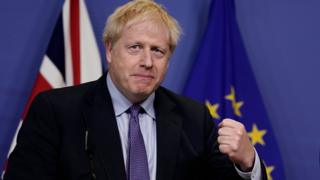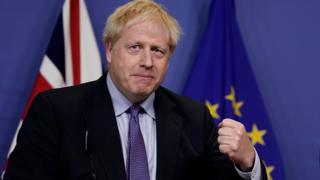Brexit deal: Your questions answered
Boris Johnson has agreed a new Brexit deal with the EU – but what does it mean and will Parliament pass…

 Image copyright Getty Images
Image copyright Getty Images A Brexit deal has been agreed by the UK and EU, but what does it all mean?
We answer a sample of the questions we have received from readers.
If Parliament rejects the deal, does Boris Johnson have to apply for an extension? – Freddie Moore, London
Under law, yes he does.
The Benn Act, passed by MPs last month, says that Mr Johnson would be required to request a three-month Brexit delay – unless he can pass a deal, or get MPs to approve a no-deal exit by 19 October. That’s Saturday.
Parliament will be sitting that day, which is when MPs are likely to hold a vote on Mr Johnson’s new deal.
Under this deal, will there be a hard border in Ireland? – William Methven, Fermanagh
No, there will not be a hard border. All sides have ruled out customs checks at the land border between Northern Ireland and the Republic of Ireland.
Mr Johnson’s suggestion that checks could take place at “designated locations” away from the border was rejected by the EU.
As a result, there would have to be some customs checks in the UK itself, at ports along the Irish Sea between Great Britain and Northern Ireland.
Does the UK still have to pay £39bn? – Richard Smith, Southampton
The UK will still pay a “divorce bill” under Boris Johnson’s deal.
However, because the UK has had an extended stay in the EU, the actual bill would now be about £33bn.
The new proposals are much the same as Theresa May’s deal. The main difference is on the crucial issue of the Irish border and whether the UK will leave the customs union entirely after the transition period.
Why does Jeremy Corbyn think it is worse than the original deal? – Jane Francis, Yateley
The Labour leader said the deal is worse than Theresa May’s because the proposals “risk triggering a race to the bottom on rights and protections”.
He said the deal would be “putting food safety at risk, cutting environmental standards and workers’ rights, and opening up our NHS to a takeover by US private corporations”. Mr Corbyn said the deal should be rejected.
Does this deal allow the UK to trade independently with the rest of the world? – Kelly Osadolor, Swindon
Yes, the UK would leave the EU’s customs union, through which matters of trade are negotiated for all of its members as a bloc.
That means the whole of the UK will be able to strike its own trade deals with non-EU countries as well as with the EU – although this could take some time.
What does this deal mean for UK nationals living outside the UK? – Zoe Howard, Netherlands
Boris Johnson’s deal mainly focuses on solving the problem of the Irish border. When it comes to citizens’ rights, he has kept the agreements made by Theresa May.
UK nationals living legally in an EU country at the end of the transition period on 31 December 2020 will be able to stay and enjoy the same rights.
Anyone arriving after that will be subject to each country’s immigration rules. Up until the end of transition, UK nationals will still be able to move freely to the EU.
Do you have any questions about the proposed Brexit deal?
Use this form to ask your question:
In some cases your question will be published, displaying your name and location as you provide it, unless you state otherwise. Your contact details will never be published. Please ensure you have read the terms and conditions.
If you are reading this page on the BBC News app, you will need to visit the mobile version of the BBC website to submit your question on this topic.





